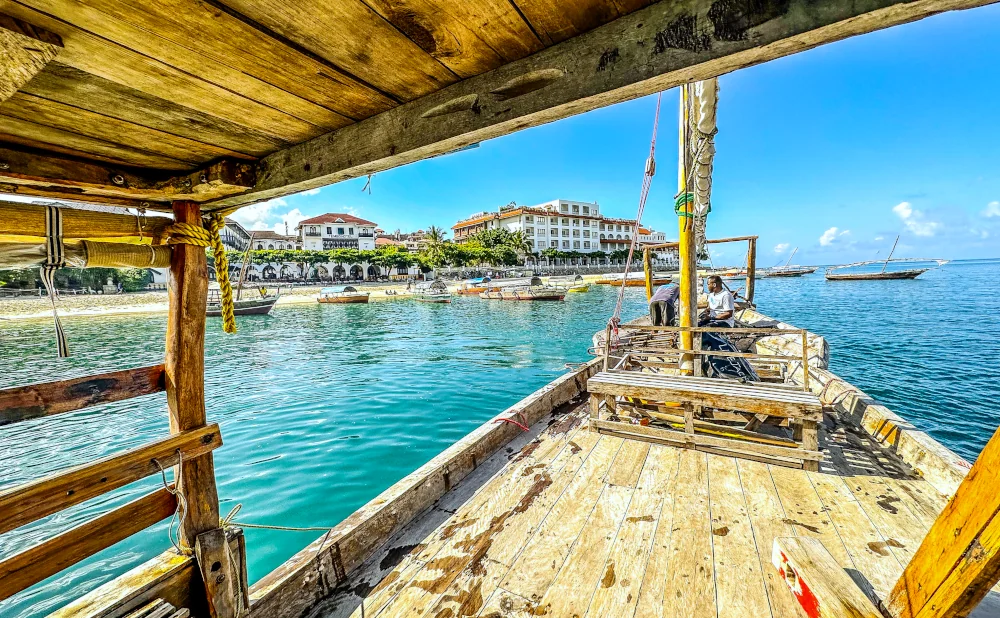10 Fascinating Facts About Zanzibar Island
Zanzibar Island, a gem off the coast of East Africa, is a world of its own.
Its rich history and unique blend of cultures make it a fascinating destination.
In this article, we delve into 10 intriguing facts about Zanzibar. From its historic spice trade to its unique wildlife, there's much to discover.
Join us as we explore the wonders of this island paradise.
""
1. A Melting Pot of Cultures
Zanzibar is a vibrant blend of cultures. African, Arab, Indian, and European influences have shaped its history and lifestyle.
The island's unique dialect of Swahili is a testament to this cultural fusion. It's a captivating place where tradition meets modernity.
""
2. The Historic Spice Trade of the "Spice Island"
Zanzibar was once the world's leading producer of cloves. Its historic spice trade earned it the nickname "Spice Island".
Today, spice farms remain a significant part of Zanzibar's economy. Visitors can tour these farms to learn about the cultivation and uses of spices.
""
3. Stone Town: A UNESCO World Heritage Site
Stone Town, the capital of Zanzibar, is a UNESCO World Heritage site. It's a historic city with a unique blend of Swahili, Arabic, Persian, Indian, and European architectural styles.
Walking through its labyrinth of narrow streets and alleyways, you'll encounter historic mosques, palaces, and markets. It's a living testament to Zanzibar's rich history.
""
4. The Birthplace of a Rock Legend: Freddie Mercury
Zanzibar is the birthplace of Farrokh Bulsara, better known as Freddie Mercury. The lead singer of the rock band Queen was born in Stone Town, Zanzibar.
His childhood home still stands today and is a popular attraction for fans. Despite his global fame, Mercury always held a deep connection to his birthplace.
""
5. Unique Wildlife: The Endemic Red Colobus Monkey
Zanzibar is home to a unique wildlife population. One of the most notable species is the Zanzibar red colobus monkey, endemic to the island.
These monkeys are a major attraction, especially in the Jozani Chwaka Bay National Park. Their playful nature and distinctive red coat make them a must-see for wildlife enthusiasts.
""
6. Zanzibar's White Sand Beaches and Crystal-Clear Waters
Zanzibar's beaches are a paradise for sun-seekers. The island is renowned for its white sands and clear turquoise waters, offering a perfect setting for relaxation.
Whether it's the popular Nungwi and Kendwa beaches or the quieter Matemwe beach, each offers a unique charm. The beaches also serve as a gateway to the island's vibrant marine life, making them popular spots for snorkeling and diving.
""
7. A Dark Past: The Arab Slave Trade
Zanzibar's history is marked by its central role in the Arab slave trade. The island served as a major hub for the trade during the 19th century, a dark chapter that has left a lasting impact.
Today, the former slave market site in Stone Town stands as a poignant reminder of this past. It houses the Anglican Cathedral and a slave monument, attracting visitors keen on understanding Zanzibar's history.
""
8. Zanzibar's Culinary Delights: A Spice Lover's Paradise
Zanzibar's cuisine is a delightful fusion of culinary traditions, reflecting the island's diverse cultural influences. The use of spices is a defining feature, a testament to its historic spice trade.
From aromatic biryanis to flavorful curries and the unique Zanzibari pizza, the island's food scene is a paradise for spice lovers. A visit to the local markets offers a sensory feast, with the air filled with the scent of spices.
""
9. The Island's Architectural Tapestry
Zanzibar's architecture is a captivating blend of Swahili, Arabic, Persian, Indian, and European styles. This architectural tapestry is a reflection of the island's rich history and cultural diversity.
Stone Town, the island's capital, is particularly renowned for its intricate wooden door designs, a testament to Zanzibar's tradition of wood carving. These doors, along with the historic buildings, create a unique and charming atmosphere that transports visitors back in time.
""
10. Zanzibar's Autonomous Government and Flag Evolution
Despite being part of Tanzania, Zanzibar maintains a degree of autonomy with its own president and set of laws. This unique political system is a testament to the island's distinct cultural identity and history.
Zanzibar's flag has also seen multiple changes throughout its history, reflecting the island's shifting political landscape. From the flag of the Sultanate of Zanzibar to the current flag of Zanzibar within Tanzania, each flag tells a story of the island's past.
"











